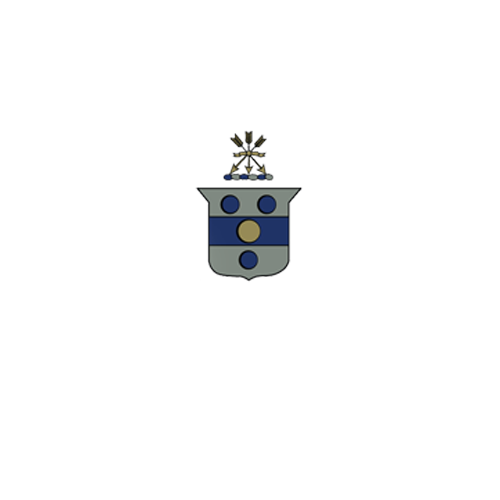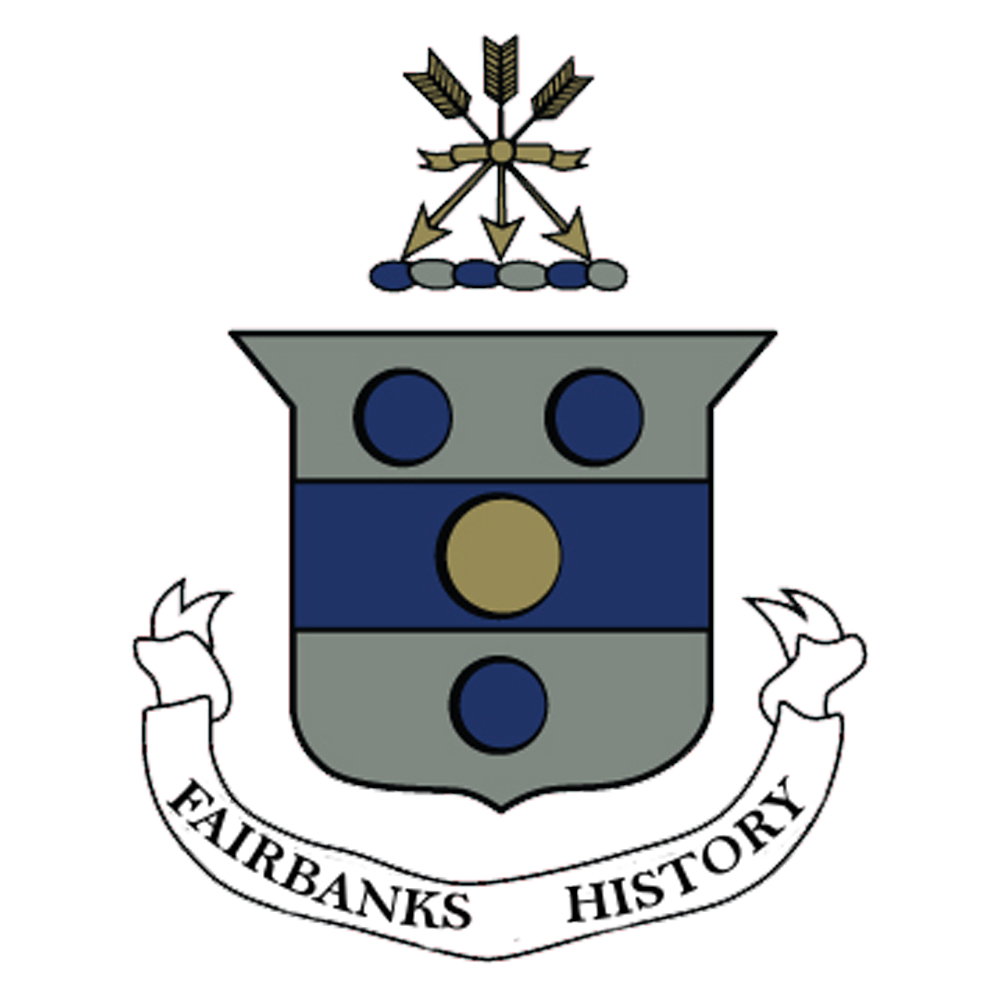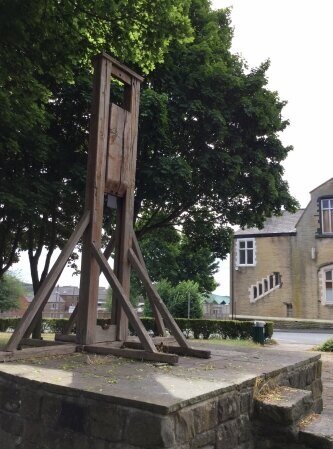The Fairbanks Family and Membership in the First Church at Dedham, Massachusetts 1638
Finem Respice
The Fairbanks Motto
The motto attached to the Fairbanks crest is Finem Respice. This is an ancient motto, but it is likely that the Fairbanks family that settled in Massachusetts Bay Colony (MBC) in the early 1600’s lived by this credo. According to the Merriam-Webster dictionary, the motto means: live so that your life will be approved after your death or consider the consequences of your actions. Like most of the early settlers of the MBC, the Fairbanks followed the Puritan faith. The Puritans believed in predestination and that you lived and worked to find the favor of God.
Fairbanks from Halifax Parish, West Yorkshire, England
The Halifax Gibbet taken by Shawnee Fairbanks Korff 2019
The Fairbanks also came from Halifax parish of West Yorkshire, England, primarily an area of many Puritans. The Halifax Gibbet or guillotine stood in the market center of the town of Halifax. Wool thieves and other criminals were beheaded for their crimes.
A familiar saying of the 17th century in that area was: From Hell, Hull and Halifax, May The Good Lord Deliver Us. Hull and Halifax, both towns in Yorkshire County of northern England, exacted severe punishments for even minor crimes.
The Fairbanks family thought spiritually and considered the consequences of their actions in their community.
Building the Membership of the Church in Dedham, Mass.
The spiritual life of Dedham proceeded with members being accepted or rejected by Mr. John Allin, minister, and Mr. John Hunting, elder. They made their decision based on what they perceived was acceptable to God and the Church. Over the winter, they and the other members received residents who wished to profess their faith and to be accepted as members.
As you remember from an earlier blog, to become a resident of the town of Dedham, the members of the town had to ratify your acceptance into the community.. https://sharminfairbanksmckenny.squarespace.com/config/pages/5bc0ed37e4966b62fe05153b
The First Church of Dedham found in A History of Dedham, Massachusetts by Frank Smith
Characteristics of Members and Non-members of the church in Dedham, Mass.
The initial group of men that formed the church, were expected to have “a spirit of wisdom, meekness, amiable spirit, innocence of life, and be a good steward that would be welcoming to new members of the church. Now the member candidates were asked to state “the working of God in their heart,” state why they believed they had the right to receive the holy order, and to persuade the church officers of “the working of faith and repentance in his/her soul.” After this profession, they could be asked questions. They were then dismissed and judged in private. If they were not accepted or there was still doubt, one of the officers would visit them to explain the reason for their rejection or give them a chance to dispel the concerns brought up against their membership.
Some of the things that were found desirable were: tenderness, broken hearted, plain hearted, repentance for offensive distempers, and innocence. Things that caused the panel to decline a person as a member were offenses that happened in England, rashness of carriage, and speech savoring self-confidence, lack of humbleness, zealousness, too addicted to the world, and being dark and unsatisfying in respect of the work of grace
In this way, ten new members were accepted into the church by April 24, 1639. This made a total of eighteen members with the initial ten men being those who formed the church. That did not mean only eighteen people attended church. Everyone in town was expected to attend and were fined if they did not. But only members received certain privileges. One of the most significant/valuable privileges, for the men, was the right to vote in any civil or spiritual affair of the town or country.
Early Members of the Church in Dedham, Mass.
Margaret Allin, the wife of John Allin was the first of the initial ten to be accepted. The officers expressed “scruples,” doubts or hesitation about some of the candidates. John Dwight, a prominent man in town was one. They waited for him to satisfy their concerns for a long while, but he was finally accepted as one of the first ten. They brought up questions about Eleazur Lusher’s wife, Robert Kemp, and John Hunting’s wife, but they also were accepted.
The wife of Joseph Kingsbury, was readily accepted even though Joseph was rejected from the initial ten men who started the church. The wife of Robert Hinsdale, another of the board to start the church, was so fearful and unable to speak in public that she fainted in church. Since she could privately profess, she was accepted.
Fairbanks Family as Members of the Church in Dedham, Mass.
The first of the original Fairbanks family to become a member of the church was Mary Fairbanks. Jonathan and Grace’s first daughter and third child. She was welcomed December 10, 1640, after her future in-laws, the Metcalfs, were accepted in 1639, and her fiance’ was accepted in March of 1639/40.
There was only one entry for a woman named Grace. There was no last name given. She was accepted in July of 1643.
Found in The Early Records of the Town of Dedham, Massachusetts, 1636-1659 by Hill, Don Gleason
It is stated that Jonathan Fairbanks (Senior), “long stood off from the church upon some scruples,” doubt or hesitations. This time, it was he who had concerns. These hesitations involved public profession of faith and the covenant. The officials had “diverse loving conferences with him.” When he finally made his public profession, he did it in such a manner that “he was readily and gladly received by the whole church,” August 14, 1646, seven years after the first members were accepted.
Though a Puritan, Jonathan Fairbanks did not blindly follow those who started the church of Dedham, but had to consider if it was in agreement with his own beliefs. He had just left England, where he was told how he could worship. Perhaps, he was hesitant to be judged and directed by other men in practicing his faith in this new colony. It appears that Jonathan was a private man in regard to public profession, and a man of deep consideration. He didn’t hurry to be one of the first signers of the Dedham covenant, thus had to be put on the waiting list for the second round of allotments for the town. He did not sign the covenant for the first church in Dedham until seven years after it was founded.
Susan Fairbanks, second daughter and 5th child, who married to Ralph Day, joined the church in 1649. John Fairbanks, Jonathan and Grace’s first child, joined in 1651. George, Jonas, or Jonathan were not found listed before 1670 , the last entries in Book II of First Church Records.
Resources
Slafter, Carlos, and Hill, Don Gleason. The Early Records of the Town of Dedham: The Births, Marriages and Deaths and Aadmissions to the Church and Dismissals Thereof. Office of the Dedham Transcript, 1888.
https://archive.org/details/earlyrecordstow00masgoog/page/n28/mode/2up/search/fairbanks
Next Up:
Going to Church in 17th Century New England








